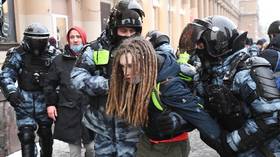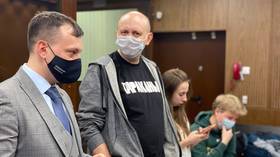Twitter & Facebook could be blocked in Russia over content calling for unauthorized protests, say proposals from country’s Senate

Popular platforms such as Facebook, Twitter, and Instagram, as well as messaging services like Telegram and video site TikTok could become unavailable in Russia if they fail to ban illegal calls to participate in protests.
Alexey Pushkov, the Chairman of the Federation Council’s Commission on Information Policy, set out the tough new proposals to reporters on Thursday. According to him, the panel “considers it necessary to strengthen Russian legislation in order to stop the use of social networks mobilizing citizens for illegal actions.”
The joint statement, which Pushkov read to journalists, alleged a number of online media giants “have become a source of calls for riots, inducements to commit illegal actions – such as those that pose a threat to the lives and health of other citizens – as well as unreliable information disseminated under the guise of reliable messages.”
Also on rt.com Putin says freedom of speech online must be defended against social media companies intent on making ‘profit at any cost’The commission added that, over the past two weeks, which saw thousands take to the streets of cities across Russia to call for the release of jailed opposition figure Alexey Navalny, these platforms had seen “open calls for mass riots,” and details of how to participate in them were shared widely. In addition, he argued, reports on the number of attendees at marches were inflated and there was an inaccurate portrayal of a violent police crackdown.
The proposals from the commission, in its words, “demand that Internet companies take the necessary measures to monitor and prevent the dissemination of any content that may be viewed as support or propaganda for unauthorized protests and violent changes in the foundations of the constitutional order of the Russian Federation.”
On Wednesday, Russian President Vladimir Putin warned that social media giants were making decisions about which content to allow, and what to censor, based on their own bottom line, rather than the social consequences. “These platforms are, of course, primarily businesses … and what is the primary concern of a business? Making a profit,” he said.
The president hinted at the possibility of stronger enforcement against illegal content shared online, saying that “we must think about it, and react to it.” However, he added, “we must not make decisions that would limit human freedoms – the freedom of choice and freedom of speech.”
Russia saw two successive weekends of mass demonstrations across the country over the past fortnight, with thousands taking to the streets to demand the release of jailed opposition figure Alexey Navalny. A number of those accused of sharing details of the protests and encouraging attendance have faced legal action in the days that have followed.
The editor of Moscow-based news website Mediazona, Sergey Smirnov, was handed a 25-day prison sentence on Wednesday for retweeting a graphic that included the timing of the planned demonstrations.
Think your friends would be interested? Share this story!














